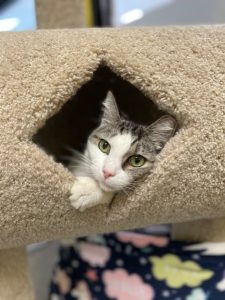
With the weather getting colder, windier, and potentially snowy, Greenhill Humane Society wants to encourage pet families to take extra precaution before heading out on adventures. Dry, cold air, chilly rain, sleet, and snow can cause chapped paws, itchy skin, and other discomforts for your pet. Follow the tips below to ensure your pets are enjoying their outside adventures this winter:
– Remember, if it’s too cold for you, it might be too cold for your pet, so keep a watchful eye on them when they are outside and bring them inside when unattended.
– Towel dry your pet as soon as they come inside, paying special attention to their feet and in-between the toes. Remove any snow from between their foot pads.
– Never shave your dog down to the skin in winter, as a longer coat will provide more warmth. If your dog is short-haired, consider getting them a coat or sweater.
– After each walk, wash and dry your pet’s feet and stomach to remove ice. Check for cracks in paw pads or redness between the toes. Ice melt products can be irritating to your pet’s feet and should be washed off. Use pet-friendly ice melts whenever possible.
– Booties can provide coverage and warmth and can also prevent ice and salt from getting lodged between bare toes and causing irritation.
– Pets burn extra energy by trying to stay warm in wintertime. Pets who spend a lot of time outdoors may need to be fed more during the cold weather.
– Make sure your companion animal has a warm place to sleep, off the floor and away from all drafts. A cozy dog or cat bed with a warm blanket or pillow is perfect.
– If your pet is shivering and refuses to play, the animal is too cold and should come inside.
– Most antifreeze is a lethal poison for dogs and cats. Be sure to thoroughly clean up any spills from your vehicle and consider using products that contain propylene glycol rather than ethylene glycol.
– Car motors are of particular danger to cats who sleep outside. Cats seek the warmth of car motors, and they can be severely injured or killed when caught in the fan belt of a car’s engine. Make it a habit to knock on the hood of the car or honk your horn before starting your car.








